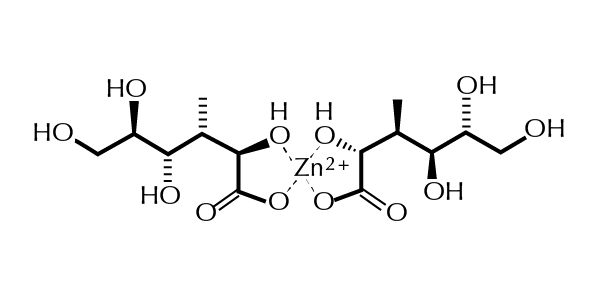What Is Zinc Gluconate?
Zinc gluconate is a combination of zinc with a form of glucose that is primarily used in skincare products to help support the treatment of acne.
Studies have suggested that zinc may help to reduce the symptoms of acne, reduce oil production and soothe angry skin.
Zinc gluconate is the zinc salt of gluconic acid, an organic compound that occurs widely in nature as a byproduct of glucose oxidation. Zinc is soluable in water, making in a versatile ingredient to include in products.
Zinc is an essential trace element for humans, which means that it must be consumed in the diet since the body cannot produce it. Zinc is required for the function of over 300 enzymes and more than 2000 transcription factors that are needed for regulation of lipid or oils, protein and nucleic acid metabolism, and gene transcription.
Zinc deficiency affects about two billion people worldwide. In children, deficiency affects growth, delayed sexual maturation, infection susceptibility, and diarrhea. In adults, zinc deficiency causes a multitude of symptoms, including dry skin, acne, impaired wound healing, disturbed sense of smell and taste, impaired immune function, loss of appetite, diarrhea, and more. To prevent zinc deficiency, zinc is available as a dietary supplement in the form of zinc gluconate.

Zinc Gluconate
the good: Zinc gluconate may help to support the treatment of acne as well as help support the healthy functioning of the skin
the not so good: Like any ingredient, zinc can cause allergic reactions in some people.
Who is it for? All skin types except those that have an identified allergy to it.
Synergetic ingredients: Works well with most ingredients
Keep an eye on: Nothing to keep an eye on here.
What Are The Benefits Of Zinc Gluconate?
Zinc gluconate is primarily found in skin care products intended to treat acne.
Skin microbiome
The exact mechanism for how zinc gluconate works when applied to skin isn’t fully understood. However, one theory, based on research, is that zinc has a balancing effect on the skin’s microbiome.
The skin’s microbiome refers to the naturally occurring microorganisms that live on the surface of skin. In fact, there are a 1,000 different bacterial species and up to 80 different fungi species that make up the skin microbiome. Zinc is thought to keep the mix of good and bad microbes in harmony.
Acne
It’s also been theorized that zinc reduces signs of acne because of its anti-inflammatory properties.
Studies over the past decade have demonstrated a central role for inflammation in the development of acne lesions. Zinc works to decrease inflammation by reducing the production of inflammatory mediators like nitric oxide.
Zinc also affects many aspects of the immune system, for instance, it is a modulator of innate immunity. An exaggerated immune response can lead to significant inflammation, thus, by regulating this response zinc is thought to decrease inflammation.
Oil production
Lastly, research suggests that topical zinc plays a role in controlling oil production. One factor that contributes to the development of acne is excessive production of sebum or the skin’s natural oil, which can lead to clogged pores. It is thought that zinc may help to control oil production by lowering the amount of the male hormones that contribute to oily skin.
The effectiveness of using zinc gluconate as an acne treatment is debated. For instance, there are studies that demonstrate topical zinc gluconate applied alone does little to nothing for acne, but when combined with an antibiotic, the results are better than applying the antibiotic alone.
Additionally, studies that have evaluated the anti-inflammatory effects of zinc gluconate have focused on the oral supplement, not the topical form.
Anti-ageing
In addition to functioning as a potential acne remedy, zinc gluconate may be used in anti-aging treatments due to its potent antioxidant properties.
Antioxidants limit oxidative damage caused by free radicals. Free radicals are dangerous because they are highly reactive and will try to become more stable by ripping electrons off all nearby molecules. This is problematic because free radicals can react with important cellular structures, like DNA, proteins, carbohydrates, or the cell membrane.
Altogether, the damage to cells caused by free radicals is known as oxidative stress. The free radical theory of aging (FRTA) states that organisms age because cells accumulate oxidative stress caused by free radical damage over time. Therefore, by applying topical antioxidants, like zinc gluconate, the skin’s important cellular components are better protected from free radicals.
Is Zinc Gluconate Vegan?
Zinc gluconate is a vegan ingredient. It is not derived from animal or animal byproduct sources. It is usually produced using bacteria or fungi.
If you are looking for a vegan product, make sure that the other ingredients in the product are vegan and that the brand is cruelty-free.
Is Zinc Gluconate Safe?
According to the U.S. Food and Drug Administration, zinc gluconate is classified as Generally Recognized As Safe (GRAS) when used with good manufacturing practices as nutrients for human consumption. Additionally, zinc gluconate is considered safe as used in cosmetics and personal care products.
References:
Saper RB, Rash R. Zinc: an essential micronutrient. Am Fam Physician. 2009;79(9):768-772.
CIR, 2018. ‘Safety Assessment of Zinc Salts as Used in Cosmetics’, Cosmetic Ingredient Review Expert Panel.







